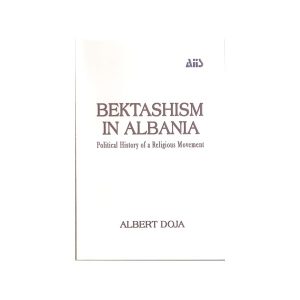The Bektashi Order is a heterodox Sufi dervish order that is nominally a part of Shia Islam but that has incorporated elements that are close to Christianity and other religions. The order was founded probably in the 13th century in Anatolia. Contrary to the information you find in some publications (including Wikipedia!), Hadji Bektash, a Persian wali living at that time, was not the actual founder of the order but a kind of patron saint that was chosen much later by the sect as a spiritual inspiration.
In the Ottoman Empire, Bektashis have had for a long time a very influential position. Possibly due to their seemingly less “strict” interpretation of Islam, they seem to have attracted quite a lot of converts from the ranks of the Janissaries, the elite soldiers of the Sultan that were recruited among young Christian boys in the Balkans (also known as devshirme).
In the 19th century, following the purge of the Janissaries, the Bektashi order lost a lot of its influence and after Atatürk declared the Turkish Republic, he banned all dervish orders and the Bektashis transferred their headquarter to Tirana, Albania. This transfer was also due to the fact that many leading figures of the Albanian independence movement, including the Frasheri brothers, came from the ranks of the dervish order.
Bektashis are famous for their religious tolerance and hospitality. They don’t keep Ramadan (instead they fast during Nowruz), they don’t reject alcohol and the women are not veiled. They have a kind of confession of the sins that seems close to the Catholic faith. It is because of these syncretistic habits together with their very unique history that make the Bektashi a frequent object of scientific research.
During Enver Hoxha’s dictatorship, Bektashis suffered just like the Christian and Sunni Muslim believers from the paranoid politics of the “First Atheist State in the World”. People who prayed could end up in front of a firing squad or in Burrel, a concentration camp, in which most prisoners didn’t survive for long.
After the fall of the Communist regime, the Bektashi, like the other religious communities enjoy again full freedom of religion, but the times have changed. Bektashism is facing the big problem of all religious groups and especially of heterodox sects: should they stick to their traditionally very little institutionalized organization or should they – in order to survive as a group – develop into a new orthodoxy.
The last aspect is the main topic of an interesting study by the Albanian scholar Albert Doja, “Bektashism in Albania – Political History of a Religious Movement”. Doja, who is a renowned Professor of Sociology and Anthropology, is coming in his very instructive work to the conclusion that when members of a previously persecuted religious minority is acquiring a degree of religious and political respectability within society at large, the doctrines of heterodoxy and liberation theology that were in the case of the Bektashis such a strong undercurrent in the time of the Frasheri brothers, fade in the background.
“In the end, the heirs of the heterodox promoters of spiritual reform and social movement turn into followers and faithful defenders of a legitimate authority. They become the spokespeople for an institutionalized orthodoxy whose support is sought by the political regime.” –
Just like Saudi Arabia was instrumental after 1990 to try to bring the “folk” Sunni Islam in Albania in line with the much stricter Wahabi ideology by providing money and “training”, Iran (via the Saadi Shirazi Foundation – officially an organization that is promoting Persian language and culture, unofficially believed to be a branch of the Iranian Secret Services) is trying to get a hold on Bektashism in Albania, a development that is seen with great skepticism in the Bektashi communities outside Albania (and also by a big group inside Albania).
The future will show which faction will prevail: the orthodox or the tolerant Sufi faction of traditional Bektashism. Doja’s study is the first to ask this question so clearly and is therefore very valuable.
Albert Doja: Bektashism in Albania – Political History of a Religious Movement, Albanian Institute for International Studies, Tirana 2008
© Thomas Hübner and mytwostotinki.com, 2014. Unauthorized use and/or duplication of this material without expressed and written permission from this blog’s author and/or owner is strictly prohibited. Excerpts and links may be used, provided that full and clear credit is given to Thomas Hübner and mytwostotinki.com with appropriate and specific direction to the original content.




 Facebook
Facebook RSS
RSS Twitter
Twitter